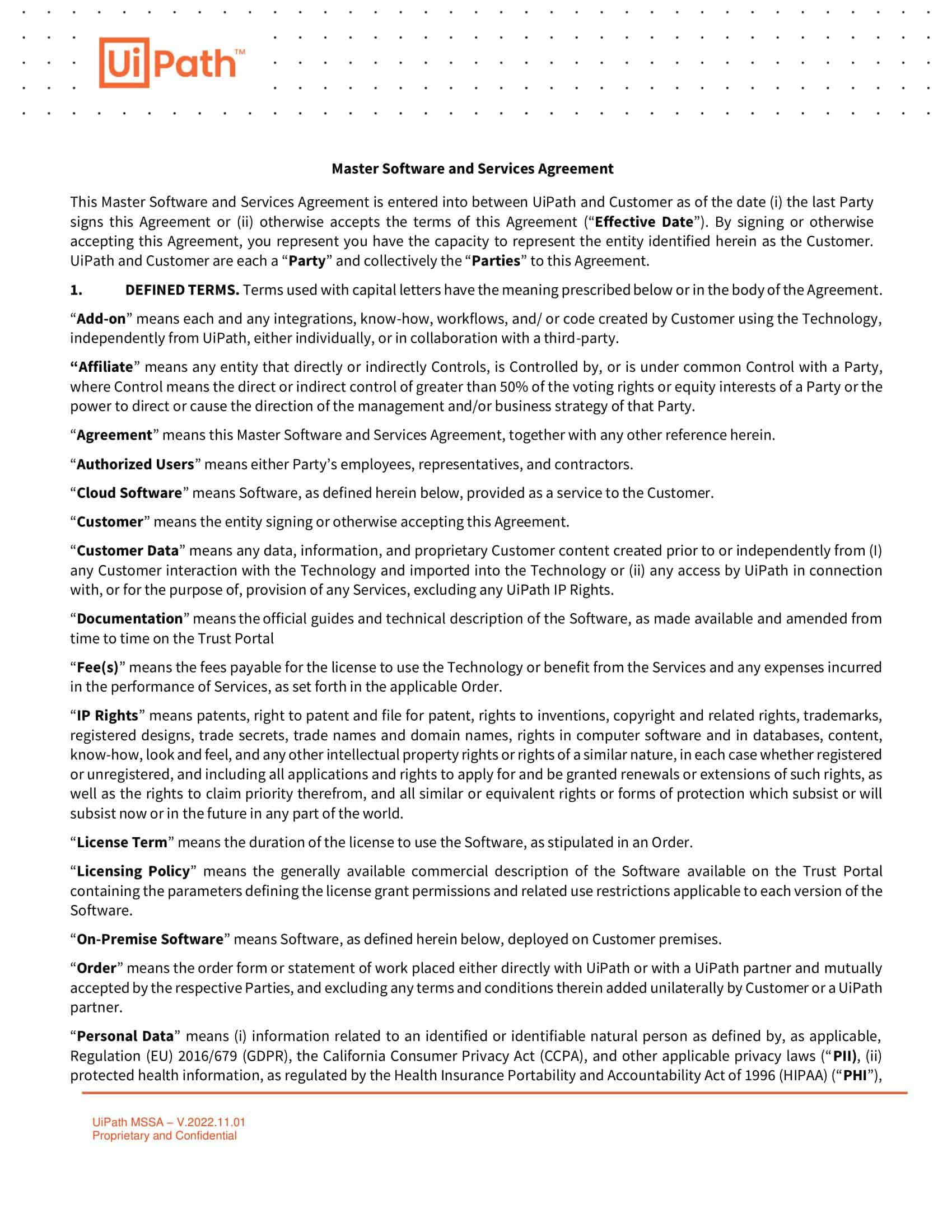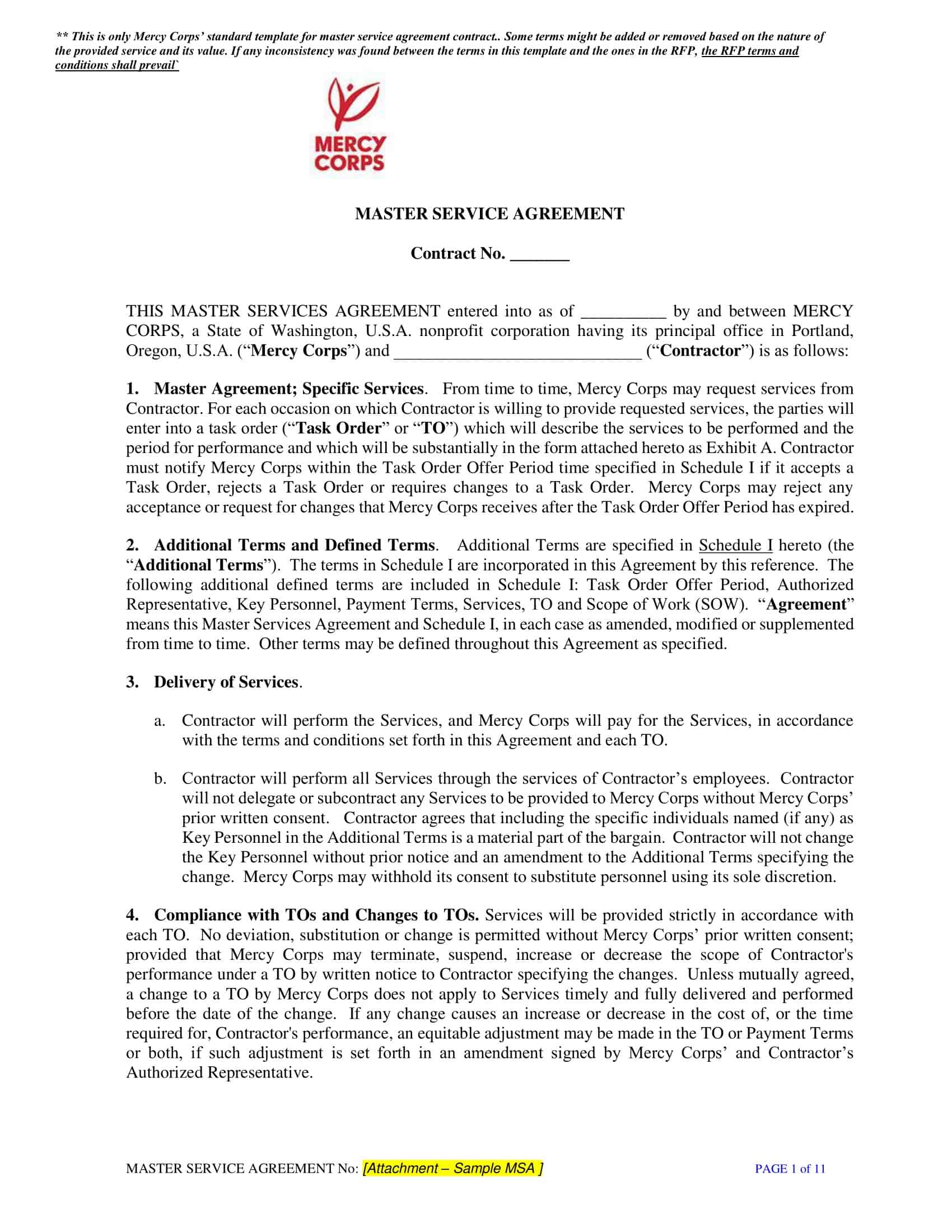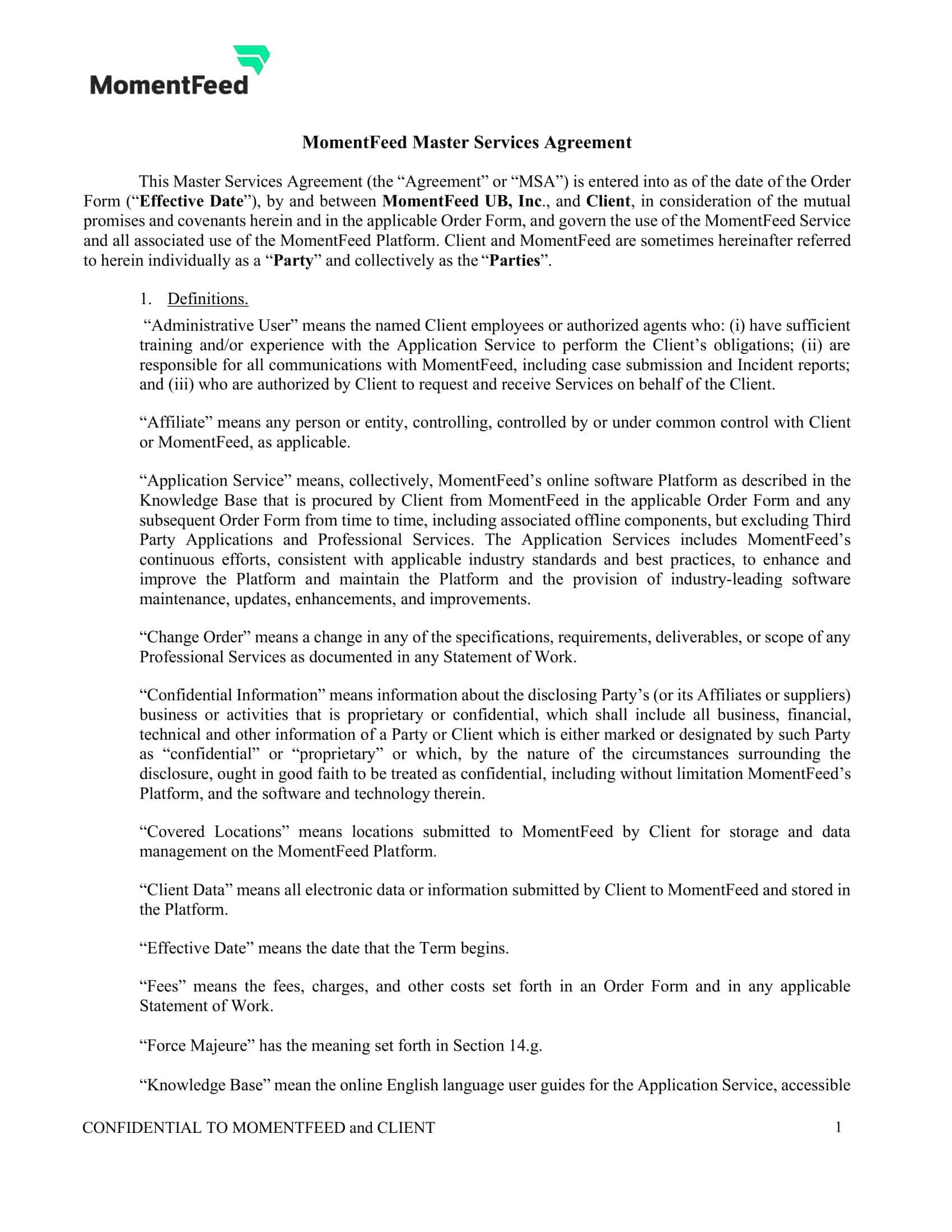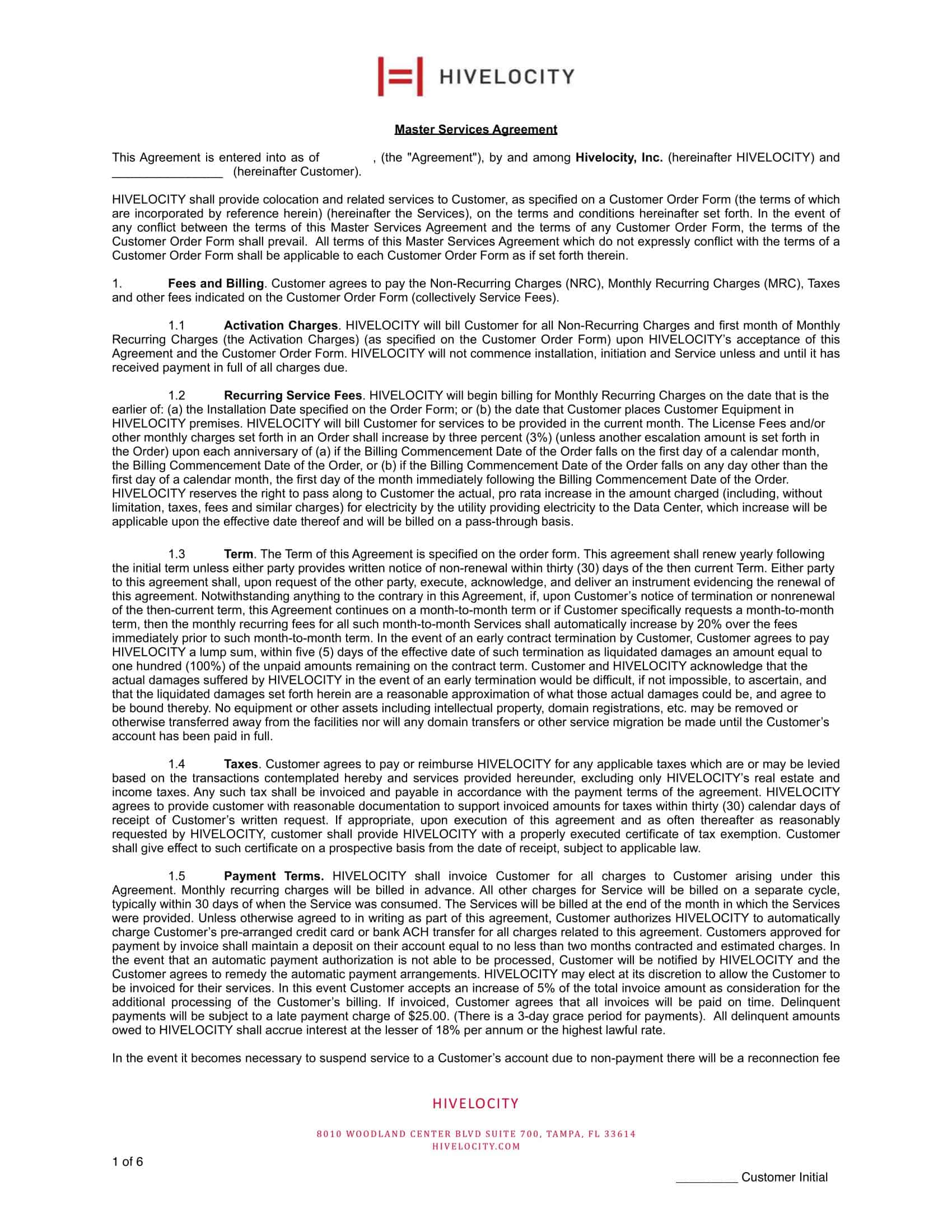Navigating the complexities of long-term business relationships can be a challenging feat, demanding meticulous attention to detail and strategic foresight. It’s in this space that a Master Services Agreement (MSA) shines, acting as a lighthouse guiding partnerships towards streamlined operations and expedited negotiation processes.
Imagine a contract that, once established, sets a robust foundation for all future transactions – no need to renegotiate or debate each term again. It’s a popular tool within the tech world, yet its practicality extends far beyond, proving valuable in client/vendor dynamics, government contracts, and even union negotiations. In this article, we will delve into the intricacies of MSAs, exploring their benefits, challenges, and offering insights to effectively leverage them for your business operations.
Table of Contents
Master Service Agreement Templates
A Master Service Agreement (MSA) template is a comprehensive and standardized contract that establishes the terms and conditions between two parties, typically a service provider and a client. It serves as a foundational document that governs the overall relationship and sets the framework for future engagements or projects.
A well-crafted MSA template is designed to provide clarity, protect the interests of both parties, and promote a smooth working relationship. It outlines the rights, responsibilities, and obligations of each party, ensuring that there is a mutual understanding and agreement on critical aspects of their collaboration.
What Is a Master Services Agreement?

A Master Services Agreement (MSA) is a contract reached between parties, often in a business-to-business context, in which the parties agree to most of the terms that will govern future transactions or future agreements. The primary advantage of such agreements is that they save time, as they negate the need to renegotiate the basic terms and conditions for every different service or transaction; these are already agreed upon in the MSA.
The MSA typically outlines terms regarding payment, delivery, and other logistical details. It may also include clauses regarding dispute resolution, confidentiality, warranties, liability, and intellectual property rights.
Why use a Master Service Agreement?
A Master Service Agreement (MSA) plays a critical role in establishing a formal relationship between two parties, generally in a business-to-business context. The MSA delineates the overall structure of the agreement, terms of the service, dispute resolution mechanisms, confidentiality parameters, intellectual property management, liabilities, warranties, and various other key aspects.
The following are some of the key advantages of using a Master Service Agreement:
Standardization of Terms and Conditions
One of the most valuable advantages of an MSA is the standardization it brings to the contractual relationship. By setting forth the standard terms and conditions that will govern various transactions or future agreements, it ensures a common understanding and interpretation of the terms. This standardization reduces confusion, eliminates the need for continual negotiations, and saves time for both parties. The result is a smoother and more efficient working relationship.
Efficiency and Expediency in Contract Execution
Once the MSA is in place, the parties only need to agree on project-specific terms—such as scope of work, price, and timeline—when initiating a new project or transaction. This level of pre-agreement significantly speeds up the process of contract execution, allowing businesses to respond more quickly to changing needs or market conditions.
Risk Management and Dispute Avoidance
An MSA provides a comprehensive framework for addressing potential legal disputes. By including detailed clauses on dispute resolution, it can help avoid litigation and ensure a swift, fair process if disagreements arise. Similarly, with well-defined clauses related to warranties, liabilities, and indemnification, an MSA can provide risk management and protect the interests of both parties.
Protection of Confidentiality and Intellectual Property
MSAs often include detailed provisions for the management of intellectual property and confidentiality. These provisions ensure that any intellectual property developed during the contractual relationship is properly managed and that any confidential information shared by the parties is appropriately protected. This adds an extra layer of security and comfort for both parties.
Building Long-Term Relationships
MSAs can play a crucial role in establishing and managing long-term business relationships. By creating a solid contractual foundation, an MSA can provide the stability and predictability that are critical for successful long-term partnerships.
What to include in a Master Services Agreement ?
The MSA sets a legal and practical framework within which parties operate, thereby reducing the need to renegotiate basic terms for each project. It’s crucial that the MSA is comprehensive, covering all possible scenarios to avoid future misunderstandings or disputes. Here’s a deeper look at what should be included in an MSA:
Scope of Agreement
The MSA should clearly define the nature and scope of the agreement, including the type of services or goods to be provided. This section may also provide a broad schedule for delivery or performance.
Pricing and Payment Terms
It should include clear provisions for pricing, payment terms, and schedules. This may include the currency to be used, acceptable forms of payment, when invoices will be issued, when payment is due, and how disputes about invoices will be handled.
Term and Termination
The duration of the MSA should be clearly outlined, along with termination rights. This includes circumstances that could lead to termination for cause (e.g., breach of contract) and provisions for termination without cause. Any requirements for notice periods should also be included.
Performance Standards
The MSA should outline the expected performance standards and obligations of both parties. It may include metrics or benchmarks that the service provider is expected to meet.
Confidentiality
MSAs typically include confidentiality clauses to protect sensitive information that either party may disclose during the course of the agreement. This section should define what is considered confidential information, obligations regarding its handling, and any exceptions to confidentiality.
Intellectual Property (IP)
The MSA should clearly define who will own any new intellectual property created during the course of the relationship, whether that be the service provider or the customer. It should also clarify how existing IP can be used by either party.
Dispute Resolution
The MSA should include a dispute resolution mechanism to resolve disagreements that may arise during the term of the agreement. This might include negotiation, mediation, arbitration, or litigation. The law governing the contract and the jurisdiction for disputes should also be clearly specified.
Indemnities and Liabilities
The MSA should clearly define the liabilities of each party and under what circumstances one party may have to indemnify (compensate for harm or loss) the other. This could relate to issues such as breach of contract, data protection breaches, or property damage.
Force Majeure
The MSA should include a force majeure clause, which outlines what will happen if either party is unable to fulfill their contractual obligations due to unforeseeable circumstances beyond their control, such as natural disasters, war, or government actions.
Representation and Warranties
Both parties typically make certain representations and warranties in the MSA, such as their power and authority to enter into the MSA.
Insurance
The MSA may specify the types and levels of insurance that the service provider must maintain. This provides protection for both parties in case of potential legal liabilities.
Assignment and Subcontracting
The MSA should clearly outline if and how the parties can assign or subcontract their obligations under the agreement to another party.
This is by no means an exhaustive list and the content of each MSA can vary greatly depending on the specific circumstances of each case.
Most Common Master Service Agreement Disputes and Risks
Master Service Agreements (MSAs) are contracts that set out the terms and conditions under which work will be performed between two parties. While these agreements help to streamline business operations, they can also be sources of legal disputes. Here are some of the most common issues that can lead to disagreements and risks:
Scope of Work (SOW) Definition: MSAs typically include a general description of the services to be provided. Disputes often arise when the actual services provided do not align with the expectations of one or both parties. This can be a result of vague or ambiguous language in the agreement, miscommunication, or differing interpretations of the contract’s terms.
Compensation Discrepancies: Compensation disagreements can arise when the fee schedule or payment terms aren’t clearly defined. Misunderstandings or disagreements over the time of payment, rate of payment, or how the payment should be made are common.
Intellectual Property Rights: These disputes may arise over ownership of the results, work product, or innovations developed during the provision of services. Parties may have differing views on who should own the rights, which can lead to legal complications if not clearly outlined.
Termination Provisions: Conflicts can arise when one party wants to end the agreement and the conditions for termination aren’t clear. This might be because the agreement does not specify a notice period, or does not define what constitutes a breach of contract.
Liability and Indemnity: Liability clauses aim to limit a party’s responsibility for certain losses or damages. Disputes can arise if one party feels that they are being unfairly burdened or that the contract’s liability provisions are not balanced.
Non-Compete and Non-Solicitation Clauses: These clauses prevent one party from competing with the other or from soliciting its employees or customers. Disagreements can occur over the scope and enforceability of these provisions.
Warranties and Representations: Disputes may occur over whether a party has met their obligations under the warranties or representations of the MSA. Misrepresentations, either intentional or unintentional, can lead to significant legal disputes.
Force Majeure: These clauses absolve parties from their responsibilities if circumstances beyond their control prevent them from fulfilling the contract. Disputes can arise when parties have differing views on whether a particular event qualifies as a force majeure.
Confidentiality breaches: MSAs often include confidentiality agreements to protect proprietary information. Disputes can arise if one party is accused of disclosing confidential information.
To manage these risks, it’s crucial to have the MSA reviewed by an attorney before it’s signed. They can ensure that the terms are clear and enforceable and that the agreement is balanced and fair for both parties. Regular reviews of the agreement can also help to identify and resolve potential issues before they lead to disputes.
How to Write Master Service Agreement
Creating a Master Service Agreement (MSA) involves careful consideration and detailed planning. Here’s a step-by-step guide on how to go about it:
Step 1: Identify the Parties and the Effective Date
Start by accurately identifying the parties involved. This includes the full legal names of the entities. This section will also include the effective date of the agreement.
Step 2: Define the Purpose
In this section, you need to establish the purpose of the agreement. Why are these two parties entering into this contract? Make sure this section is clear and specific.
Step 3: Scope of Work
Create a comprehensive scope of work (SOW). This is where you define what services will be provided, by whom, and to what standard. The SOW can be added as an exhibit or an attachment to the MSA, making it easy to change for different projects without needing to amend the entire agreement.
Step 4: Pricing and Payment
Here you need to outline the terms of payment. Define how much the service provider will be paid, when the payments will occur, and what methods of payment will be accepted. Be clear about whether there will be any retainer fees, late payment penalties, or discounts for early payment.
Step 5: Intellectual Property
Determine and define who will own any intellectual property (IP) that arises from the services provided under the agreement. Will the service provider retain rights, or will IP be assigned to the client? Make sure this is clearly outlined.
Step 6: Confidentiality Clause
Include a confidentiality clause to protect any private business information that may be shared between the parties during the term of the agreement. Define what is considered confidential information and the obligations of the parties to protect it.
Step 7: Liability and Indemnity
Establish clauses on liability and indemnity. This should include how risks are shared between the parties, any limitations on liability, and any obligations for one party to indemnify (compensate) the other for particular losses.
Step 8: Warranties and Representations
Include any promises made by the parties, such as a promise that the service provider has the necessary skills and qualifications to provide the services.
Step 9: Term and Termination
Define the term of the MSA and the conditions under which it can be terminated. This should include provisions for termination for convenience, for cause, and the effects of termination.
Step 10: Dispute Resolution
Identify the methods for resolving any disputes that may arise under the agreement, such as mediation or arbitration, and the governing law (which jurisdiction’s laws will apply to the agreement).
Step 11: Force Majeure
Include a force majeure clause that defines extraordinary events or circumstances beyond the control of the parties that could delay or prevent one or both parties from fulfilling their obligations.
Step 12: Miscellaneous
Include standard contractual provisions, such as entire agreement (stating that the contract is the final and whole agreement between the parties), severability (if one provision is invalid, the rest of the contract still stands), and assignment (whether the contract can be assigned to another party).
Step 13: Review, Revise and Approve
Once the MSA has been written, both parties should review the agreement thoroughly, make any necessary revisions, and then approve the final document. It may be beneficial to have a lawyer review the contract to ensure all bases are covered.
Step 14: Execution
Lastly, once both parties are in agreement, they should sign and date the contract. Both parties should retain a fully signed copy of the MSA for their records.
FAQs
How is an MSA different from a Service Level Agreement (SLA)?
An MSA is a contractual agreement that outlines the general terms and conditions of the business relationship. An SLA, on the other hand, is often a section within an MSA or a standalone contract that specifically outlines the expected level of service in measurable terms.
Can an MSA be terminated?
Yes, an MSA can be terminated, but the conditions for termination need to be clearly stated in the contract itself. This often includes notice periods and whether any fees will be associated with early termination.
What happens if there is a breach of an MSA?
If a party breaches the MSA, the non-breaching party may have legal remedies such as termination of the agreement, seeking damages, or specific performance. The exact consequences will depend on what is outlined in the MSA itself.
Who needs an MSA?
An MSA is useful for any business that plans to engage in repeated transactions with another entity. This includes businesses providing ongoing services, B2B companies, and long-term client-service provider relationships.
How long does an MSA last?
The duration of an MSA is determined by what is stated in the agreement. It could last for a specific term, such as one year, or it could continue indefinitely until terminated by either party.
Do I need a lawyer to create an MSA?
While it’s possible to draft an MSA without a lawyer, it’s recommended to have one involved. A lawyer can help ensure all necessary terms are included, that the language is clear and unambiguous, and that your interests are well protected.
Can an MSA be revised?
Yes, an MSA can be revised or amended, but any changes must be agreed upon by both parties. Typically, amendments to an MSA must be made in writing and signed by both parties to be valid.
Who signs the Master Service Agreement?
The MSA is usually signed by a representative from each party who is authorized to enter into binding contracts on behalf of their respective organization.
What is a non-compete clause in an MSA?
A non-compete clause prohibits one party from engaging in business activities that compete with the other party. The specifics of what constitutes competition, and the duration and geographical scope of the clause, should be clearly outlined in the agreement.
Can an MSA be retroactive?
While an MSA can technically be drafted to be retroactive, it’s generally recommended to avoid this whenever possible. Retroactive contracts can create confusion and may face enforceability issues.
Can I negotiate terms in an MSA?
Yes, the terms in an MSA are negotiable. Both parties should review the agreement carefully and negotiate terms as necessary before signing.
What is a breach of an MSA?
A breach of an MSA occurs when one party fails to fulfill their obligations as outlined in the agreement. This could include failing to complete work as promised, failing to make payment, or violating any other terms of the contract.










































![Free Printable Roommate Agreement Templates [Word, PDF] 1 Roommate Agreement](https://www.typecalendar.com/wp-content/uploads/2023/06/Roommate-Agreement-150x150.jpg)
![Free Printable Credit Card Authorization Form Templates [PDF, Word, Excel] 2 Credit Card Authorization Form](https://www.typecalendar.com/wp-content/uploads/2023/06/Credit-Card-Authorization-Form-150x150.jpg)
![Free Printable Payment Agreement Templates [PDF, Word] 3 Payment Agreement](https://www.typecalendar.com/wp-content/uploads/2023/05/Payment-Agreement-1-150x150.jpg)
